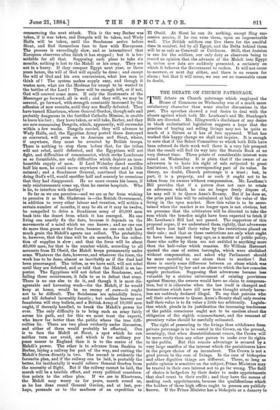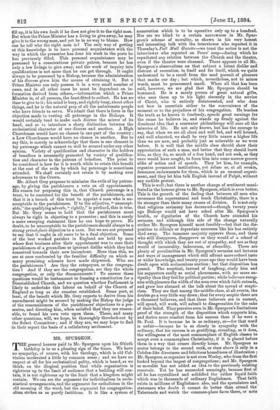THE DEBATE ON CHURCH PATRONAGE.
THE debate on Church patronage which employed the House of Commons on Wednesday was of a much more satisfactory character than some similar discussions in the past. The speeches showed a real desire to deal with the abuses against which both Mr. Leatham's and Mr. Stanhope's Bills are directed. Mr. Illingworth's disclaimer of any desire to block ecclesiastical legislation suggests a hope that the practice of buying and selling livings may not be quite so much of a fixture as it has of late appeared. What has worked this happy change we shall not inquire. It is enough to note that if the Select Committee to which both Bills have been referred do their work well there is a very fair prospect that the result will find its way into the Statute Book at no very distant time. Three points of considerable interest were raised on Wednesday. It is plain that if the owner of an advowson is to have his right of sale subjected to great limitations, it will lose a corresponding part of its value. In theory, no doubt, Church patronage is a trust ; but, in part, it is a property, and as such it ought not to be taken from its owners without compensation. Mr. Leatham's Bill provides that if a patron does not care to retain an advowson which he can no longer freely dispose of, he may sell it to Queen Anne's Bounty. But if he does so, the price paid him will be calculated at half the value of the living in the open market. How this value is to be ascer- tained when the market is no longer open is not obvious, but we presume that the arbitrators will be directed to take the sum which the benefice might have been expected to fetch if Mr. Leatham's Bill had not passed. The supporters of this proposal argue, if we understand them rightly, that advowsons will have lost half their value by the restrictions placed on their sale ; and that as these restrictions are only what ought to have been imposed long ago, as a matter of public policy, those who suffer by them are not entitled to anything more than the half-value which remains. Sir William Harcourt quoted the case of rotten boroughs, which were abolished without compensation, and asked why Parliament should be more merciful to one abuse than to another But there is surely some difference between an abuse which was never recognised by law and an abuse to which the law concedes ample protection. Supposing that advowsons became less valuable by a stricter enforcement of existing provisions against Simony, the owners would have no claim to compensa- tion, but it is otherwise when the law itself is changed and transactions which have till now been thought utterly harm- less are suddenly declared illegal. To say that patrons who sell their advowsons to Queen Anne's Bounty shall only receive half their value is to fix value a little too arbitrarily. Legisla- tion which pleads in its justification the increasing tenderness of the public conscience ought not to be careless about the obligation of the eighth commandment, and the remanet of pecuniary value should be carefully estimated.
The right of presenting to the livings thus withdrawn from private patronage is to be vested in the Crown, on the ground, seemingly, that when disestablishment comes, the Crown will be more ready than any other patron to make over its rights to the public. But this remote advantage is secured by a very large sacrifice of the interest which the parishioners have in the proper choice of an incumbent. The Crown is not a good patron in the case of livings. In the case of bishoprics and other dignities things are different. There, so long as public opinion is sensitive on the subject, Prime Ministers may be trusted in their own interest not to go far wrong. The field of choice is hedged-in by their desire to make appointments that shall count to their credit ; and they have the means of making such appointments, because the qualifications which the holders of these high offices ought to possess are publicly known. If the Prime Minister has a bishopric or a deanery tb
fill up, it is his own fault if he does not give it to the right man. But when the Prime Minister has a living to give away, he may give it to the wrong man, and yet be in no way to blame. How can he tell who the right man is ? The only way of getting at this knowledge is to have personal acquaintance with the way in which the presentee has done his work in the posts he has previously filled. This personal acquaintance may be possessed by a conscientious private patron, because he has only a few livings to give away, and the work of inquiry into qualifications is not more than he can get through. It ought always to be possessed by a Bishop, because the administration of his diocese gives him the means of obtaining it. But a Prime Minister can only possess it in a very small number of cases, and in all other cases he must be dependent on in- formation derived from others,—information which a Prime Minister is, of all persons, the least fitted to collect. He has no time to give to it; his mind is busy, and rightly busy, about other things, and he is the natural prey of all the unfortunate people who have friends to serve. We admit that there is force in the objection made to vesting all patronage in the Bishops. It would certainly tend to make each diocese the mirror of its head, and so to introduce a sharp distinction between the ecclesiastical character of one diocese and another. A High Churchman would have no chance in one part of the country ; a Low Churchman would have no chance in another.. But to say this, is merely to acknowledge that there is one element in lay patronage which cannot so well be secured under any other system. Variety of qualification and character in the holders of benefices is necessarily promoted by variety of qualifica- tion and character in the patrons of benefices. The point to be considered is how far it is worth while to retain this benefit at the cost of the evils by which lay patronage is sometimes attended. We shall certainly not retain it by making over advowsons to the Crown.
Mr. Albert Grey proposes to minimise the evils of lay patron- age, by giving the parishioners a veto on all appointments. His reason for proposing this is, that Church patronage is a trust, to be exercised for the benefit of the parishioners, and that it is a breach of this trust to appoint a man who is un- acceptable to the parishioners. If to the adjective, " unaccept- able," the qualifying adverb, " rightly," is prefixed, this is true. But Mr. Grey seems to hold that the parishioners must always be right in objecting to a presentee ; and this is surely a more sweeping statement than he can hope to prove. No doubt, to be unacceptable to the parishioners should always be a strong 1w-inlet-facie objection to a man. But we are not prepared to say that it ought in all cases to be a final objection. Some of the best worked parishes in England are held by men whose first business after their appointment was to cure their parishioners of a groundless or ignorant dislike which they had conceived towards their, new incumbent. More than this, we are at once confronted by the familiar difficulty on which so many promising schemes have made shipwreck. Who are the parishioners ? Are they the ratepayers, or the congrega- tion I And if they are the congregation, are they the whole congregation, or only the cbmmunicants ? To answer these questions would be tantamount to framing a constitution for a Disestablished Church, and we question whether Parliament is likely to undertake this labour on behalf of the Church of England so long as she remains established. Some part, at least, of the benefit which Mr. Grey expects to derive from his amendment might be secured by making the Bishop the judge of the reasonableness of the parishioners' objections to a pre- sentee, and directing him, when satisfied that they are reason- able, to found his own veto upon them. These, and many other questions, will, we hope, be thoroughly threshed-out by the Select Committee ; and if they are, we may hope to find in their report the basis of a satisfactory settlement.



































 Previous page
Previous page